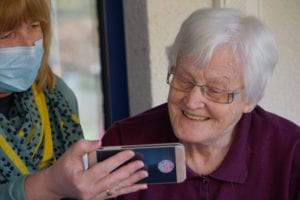Who is a member?
Our members are the local governments of Massachusetts and their elected and appointed leadership.
 A national poll in June found that the percentage of adults ages 50 to 80 experiencing feelings of isolation has doubled during the COVID-19 pandemic.
A national poll in June found that the percentage of adults ages 50 to 80 experiencing feelings of isolation has doubled during the COVID-19 pandemic.
In 2018, 27% of this age group reported that they “sometimes or often” feel isolation from others, according to the National Poll on Healthy Aging, conducted by the University of Michigan. In June, the poll found the proportion had increased to more than half.
While many older adults have been dealing with social isolation and loneliness since before the pandemic struck, communities have been creative and innovative in addressing the issue, particularly during the pandemic, and many older adults are part of the solutions that keep peers engaged and connected.
Most councils on aging have their physical structures closed to the public, but they have been working tirelessly to provide meals, physically distanced outdoor exercise, volunteer opportunities, drive-by birthday parties, and much more. Many have partnered with local schools to have students create uplifting artwork or letters to older adults that accompany grab-and-go meals at the council on aging. Some have “driveway visiting programs,” or create art activity bags with instructions posted on YouTube or the local cable access station.
During a time when so many activities have gone online, however, internet access and affordability continues to be a problem for many older adults.
The Community Compact IT grant program, which opened another round on Sept. 15, provides an opportunity to connect affordable senior housing – and any affordable housing site – with the necessary equipment.
While there are a range of possible uses for the IT grants, the pandemic has created an awareness around social connectedness. Municipalities have a unique chance to direct this funding toward keeping lower-income older adults and others connected to health, wellness and social engagement opportunities.
On the affordability side, the federal Lifeline program helps lower the monthly cost of phone and internet. Information is available online from the Massachusetts Department of Telecommunications and Cable, which oversees both the implementation and consumer education efforts for the Lifeline program in Massachusetts.
The Task Force to End Loneliness and Build Community, led by AARP Massachusetts and UMass-Boston’s Gerontology Institute, will discuss a broad range of efforts to address social isolation that have emerged in communities across the state during a virtual summit on Oct. 1.
Written by James Fuccion, senior director of the Massachusetts Healthy Aging Collaborative